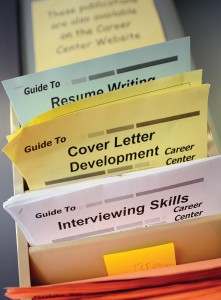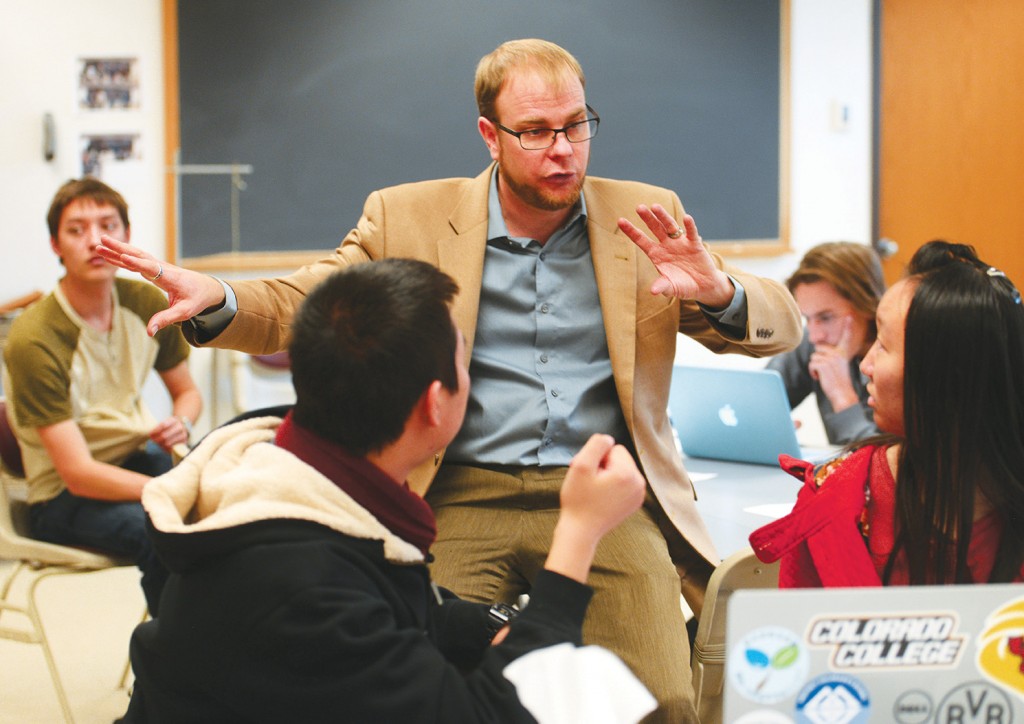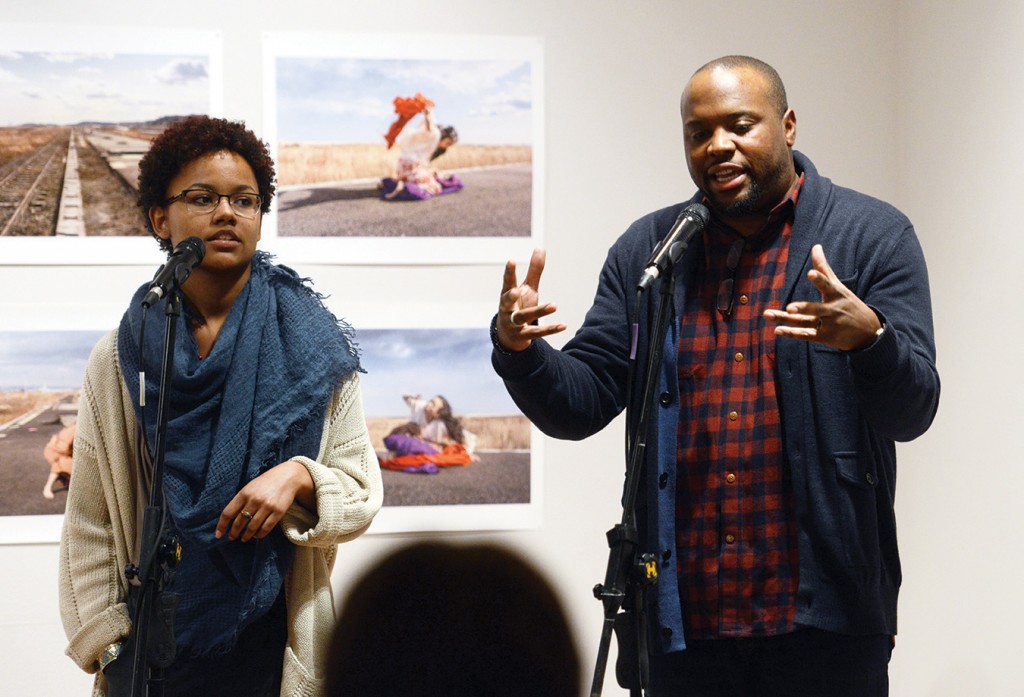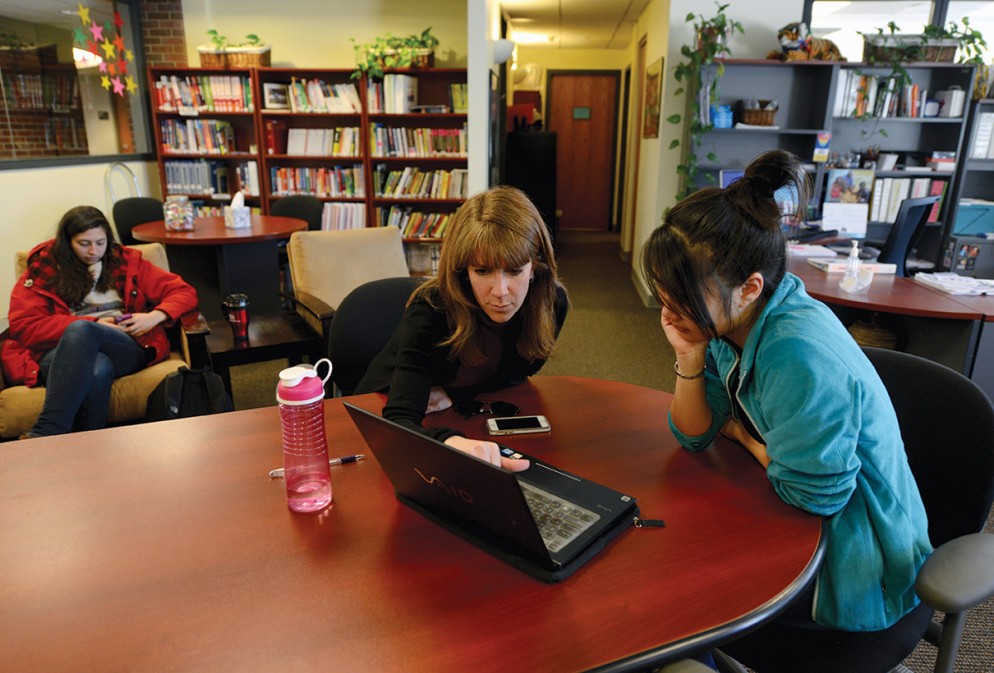Change happens fast in our modern world.
So how does a liberal arts college produce students who can keep pace with global changes, economic challenges, and increased competition for jobs?
The college has been considering this question very carefully, particularly over the past several years.
Fortunately, CC finds itself in a position of strength, with impressive demand from applicants and families who understand the value of a CC educational experience as preparation for life and career. Word has gotten out about the Block Plan, the distinctive place of learning in the Rocky Mountains, and the passionate, engaging learning community, resulting in a strong reputation in the U.S. and around the world.
Using the guiding principles of the strategic plan, “The Colorado College Plan: Building on the Block,” the college has found new ways to capitalize on its strengths so it can help students become lifelong learners and imaginative, inspired leaders in their chosen fields. (And students who have no idea about their chosen fields can get help to choose mindfully.)
The Career Center is not just a place to get resume help.
 The Career Center supports the liberal arts mission of the college by helping students develop their professional capabilities, tell their stories, and build resilience for life in the working world.
The Career Center supports the liberal arts mission of the college by helping students develop their professional capabilities, tell their stories, and build resilience for life in the working world.
Those aforementioned students, who are engaged, passionate, and intellectually curious about a lot of subjects, but may be confused about exactly where to aim their career focus, can gain a lot by using the Career Center.
Megan Nicklaus was hired as Career Center director in 2013. She has helped to lead a rethinking of the center’s efforts.
“The Career Center has expanded its focus. While we still help students search for job/internship opportunities, develop their resumes and cover letters, and prepare for interviews, we are also guiding students through the process of identifying their strengths and interests.”
In addition, the Career Center is:
- Teaching students to understand change, take action, and manage transitions.
- Supporting students as they expand their knowledge of the professional workplace, and discover paths to opportunities as they prepare to transition into employment or graduate/professional school.
- Teaching students how to leverage personal connections and networks.
- Educating students in social and business etiquette to prepare them for professional interactions.
To make it easy for students to get started, the Career Center began holding drop-in hours last year, 1:30 to 3:30 p.m. Mondays-Thursdays. Students can stop by for a 20-minute session with a staff member without an appointment.
The Career Center is striving to ensure that students see it as relevant to the needs in their daily lives now, not just in their future job searches.
“Becoming a resident adviser is very popular among students, so we worked with Residential Life to host sessions to help students prepare their RA applications,” said Nicklaus. The sessions covered everything from helping students identify their strengths and skills and connecting them to the job description, to developing a compelling application and preparing for their interview.
“This is a way we can help students prepare for the internship/job application process and it’s relevant and meaningful to their lives.”
Nicklaus said she and her staff also recognized that preparing students for a successful transition to life after graduation should not be the job solely of the Career Center, but rather a community effort. So the center partnered with the Human Resources Department to conduct a workshop each semester for student employee supervisors.
“These individuals are in a unique position to help our students as they continue to develop their professional identities,” she said.
The Career Center has also restructured internally so that each career coach supports several industry “pathways.” This allows coaches to develop relationships with alumni, employers, and professionals within an industry and facilitate connections with students interested in these industries.
The center also helps students find and obtain internships. Currently, 56.5 percent of graduating CC seniors reported they had completed at least one internship during their college experience.
Nicklaus acknowledged that the Block Plan can make it difficult for students to do an internship during the academic year, because their schedules change virtually every four weeks. However, the Block Plan does not hinder students’ ability to participate in summer internships.
“Some organizations can be very flexible in their scheduling and while summer is the primary time when our students participate in internships, some students do participate during the academic year. In select instances, a student may take a block off if a company has a specific project that they can complete in four weeks,” she said.
The center also administers internship-funding awards; students who would like to participate in unpaid or underpaid internship opportunities but can’t afford to may apply.
To further the internship cause, the center focuses on seeking out and building relationships with parents and alumni within organizations willing to champion CC students as candidates.
“Our students have diverse interests and we have been collecting data to understand what types of internship opportunities our current students are interested in, as well as looking at where our alumni have found success so that we can focus our efforts in the right direction,” Nicklaus said.
Alumni and parents can help with internships in a variety of ways:
- Register online for OurCC Connections, a searchable database of more than 6,000 Colorado College alumni and parents who have volunteered to be a resource to students and fellow alumni about careers and career networking.
- Join The Official Colorado College Alumni Group on LinkedIn.
- Notify the Career Center (careercenter@colorado college.edu) about paid internship opportunities.
- Hire CC students as paid interns.
Students are taking note of the changes at the Career Center and engaging more.
“Last year, we increased our student engagement by 23.7 percent and connected with 49 percent of the student body. Just this first semester of 2015, we have already increased our student engagement by 15 percent and engaged 41 percent of the student body. This doesn’t account for the additional ways that we might have engaged students through technology, Half Block, and in-class presentations,” Nicklaus said.
“We recognize that our students are going to have several jobs throughout their career journey and many will not only have various jobs, but will also switch industries and the type of work they are doing. We want students to be prepared to create their own opportunity by understanding what their story is and how to tell it in a compelling way, build connections and grow and leverage their network, recognize opportunities when they present themselves, and identify various paths to opportunities.”
Another path to opportunity for CC students is the Dynamic Half Block Program.

Erik Daehler ’98 speaks to students in his class, Investigations in Engineering: A Career in Engineering, during Half Block in January. Photo by Bryan Oller
The college also recently re-envisioned Half Block, in existence for nearly 25 years as a shortened, credit-bearing academic session between Winter Break and the start of Spring Semester.
Now, there are credit and non-credit Dynamic Half Block courses. New offerings concentrate on what students need to do to prepare for the future in both their academic and professional careers.
The for-credit Dynamic Half Block courses are academic in nature, more narrowly focused than regular-session classes, and often somewhat experimental and interdisciplinary. According to Mike Siddoway, associate dean of the faculty, they can also be a good way for students to prepare for more in-depth study in a particular subject area.
“A student who has had no previous experience with the Classics might take a Classics Half Block course. They can get some exposure to Latin or Greek and get up to speed before they take a full-blown course,” Siddoway said.
Since January 2014, the college has added non-credit bearing courses designed to help students identify strengths, explore interests and industries, and develop and enhance professional skills.
The opportunities include:
- Professional development sessions to explore interests, search for opportunities, and discover what it takes to build the skills needed to break into sports, creative arts, philanthropic, and public policy industries.
- Skill-building offerings to start building or enhancing skill sets to become competitive for internships, graduate/professional school, and full-time jobs.
Nicklaus is intimately involved with developing these Dynamic Half Block courses, as is the Student Life Division.
“We want to provide students with opportunities to reflect on and articulate the relevance of their CC experience and build professional skills that will ease their transition to the workplace,” she said.
This year, students learned to develop their stories, write an effective pitch letter to entice an agent to request their manuscript, and develop taglines for their stories from Steven Hayward, author and associate professor of English, and Andrew Pyper, author.

Flutist and composer Jane Rigler, left, and Assistant Theatre and Dance Professor and hip-hop artist Idris Goodwin perform in a downtown Colorado Springs gallery in January. Goodwin performed solo and with Colorado College students as part of a Dynamic Half Block class, The Vocab. Photo by Bryan Oller
Or they could learn the art of writing poetry and presenting it to an audience at a poetry slam facilitated and taught by Idris Goodwin, assistant professor of theatre and dance.
Students also could learn about leadership styles and enhance or develop their skills during Foundations in Leadership: Understanding Yourself in the Context of Leadership.
Aspiring musicians had the opportunity to learn the business of music, as well as practice during jam sessions with current artists and bands from the Denver and Colorado Springs areas.
The Dynamic Half Block program is not confined to only currently enrolled students. This year, young alumni had the opportunity to take the Princeton Review’s GMAT prep course in Denver.
In fact, alumni are involved in Half Block in a variety of ways: from sharing their experiences, wisdom, and advice with students to helping students with professional skill development.
“Alumnus Peter Maiurro ’05 ran students through a hiring simulation game that helped them understand the importance of tailoring their application documents to a position and how to effectively tell their stories. Other alumni participated in a networking event to help students practice the art of working a room and having conversations,” Nicklaus said.
Alex Fitzgerald ’14 talked to a 2015 Dynamic Half Block class about his experience with his start-up, GetOutfitted, which rents and delivers top-quality ski clothing and accessories to resorts all over the United States.
“I wanted to speak to the class because I thought I could share some of the things I have learned about start-ups, especially entering them from a liberal arts background that didn’t give me technical skills such as coding. I also wanted to offer my help to anyone interested in pursuing the Big Idea,” Fitzgerald said, speaking of the annual pitch competition providing seed money, resources, and ideas for students with an entrepreneurial interest.
Response to the Dynamic Half Block program has been robust. In all, 584 students participated. Participation in both the for- and non-credit courses provided students with new and expanded opportunities during the two weeks before Block 5.
Twenty-four alumni served as panelists during the non-credit courses, and 12 students traveled to Florence, Italy, for a Half Block Away in the Creativity: Arts and Artisans offering.
Other CC programming helps students get a leg up on their careers.
The new Innovation Institute programming adds to the inventory of CC resources assisting students in preparing for life after graduation. Among other skills, these programs help students get comfortable developing and launching businesses and social entrepreneurship ventures.
“Innovation and creativity are increasingly essential components of the world economy,” said Patrick Bultema, executive director of the Innovation Institute at CC. “We’re teaching students how to lean into the start-up economy while they’re still on campus, so they’re more relevant and prepared to become part of the creative class once they graduate.”
The Keller Family Venture Grant Program for Student Research, funded by the Keller Family Foundation, allows CC students to imagine, articulate, and bring to life their own original research project. The maximum individual grant is $1,000. Last year the Keller Venture Grant Program funded $98,379 in student research and 109 Colorado College students pursued their own individual research projects on campus, across the United States, and around the world. Project proposals must focus on individual student research and applicants must have a faculty sponsor.
Venture Grants sometimes serve as a jumping-off point for students into exciting careers or graduate school ventures. A few examples of recent graduates’ Venture Grants include:
- Joel Begay ’14, “Healthcare Accessibility in the Pascua Yaqui and Tohono O’odham Tribes”
- Benjamin Munyao ’14, “HIV/AIDS and Malaria Insurance in Kenya”
- Timothy Bruns ’14 and Mark Harris ’14, “Wadi Climbing: Bringing Recreational Opportunity to Palestine”
- Sarah Philipps ’13, “Student Partnership in Action: Globe Med in East Africa”
